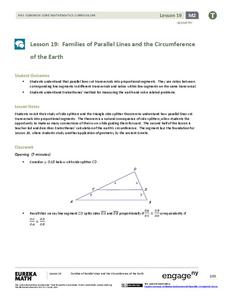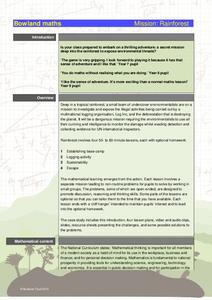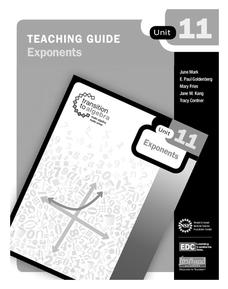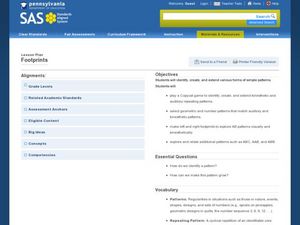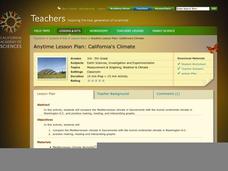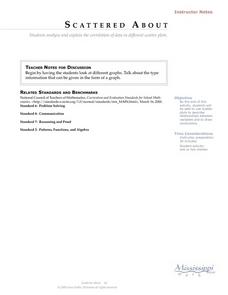EngageNY
Algebraic Expressions—The Distributive Property
Do your classes truly understand the distributive property? Use a demonstrative lesson to represent the distributive property in various ways. Learners solidify understanding by creating a geometric pattern for distributive...
EngageNY
Families of Parallel Lines and the Circumference of the Earth
How do you fit a tape measure around the Earth? No need if you know a little geometry! Pupils begin by extending their understanding of the Side Splitter Theorem to a transversal cut by parallel lines. Once they identify the...
02 x 02 Worksheets
Inverse Variation
Discover an inverse variation pattern. A simple lesson plan design allows learners to explore a nonlinear pattern. Scholars analyze a distance, speed, and time relationship through tables and graphs. Eventually, they write an equation to...
Curated OER
Linear Regression and Correlation
Learners explore scatter plots. In this linear regression lesson, groups of pupils graph scatter plots and then find the line of best fit. They identify outliers and explain the correlation. Each group summarizes and shares their...
Bowland
Mission: Rainforest
Young environmentally conscious mathematicians solve a variety of problems related to the central theme of uncovering illegal logging activities. They determine a base camp based on given constraints, investigate logging activities and...
Geography 360°
Exponents
Don't let the rules overrule the lesson. Mental math steps in and helps learners understand exponent patterns. The material focuses on the introductory problems of exponents, such as simplifying expressions. Teacher guides are...
EngageNY
Comparing Linear and Exponential Models Again
Making connections between a function, table, graph, and context is an essential skill in mathematics. Focused on comparing linear and exponential relationships in all these aspects, this resource equips pupils to recognize and interpret...
Curated OER
Attributes and Patterns with Buttons
Students work with attribute buttons in order to sort, create, and analyze patterns. Students practice identifying patterns and verbalizing the sorting rules and patterns they used. Sample assessments and rubric are provided.
Curated OER
Ranchers and Patterns
Fifth graders engage in problem solving. In this patterns lesson, 5th graders are presented with a problem regarding ranching that they solve as a class. Students watch a video about how patterns are used in the real world. Students...
Curated OER
The Fibonacci Sequence
Students investigate a numerical pattern and look for evidence of mathematical patterns in nature. They solve puzzles and work with a partner to predict sequential numbers in a series.
Curated OER
Symmetry with Shapes
Students analyze a symmetrical stamp design with an equal balance of light and dark to create a pattern in succession. In this shape design lesson, students review concepts of sign, symbol and language across cultures. Students analyze...
Curated OER
Footprints
Students explore patterns. In this patterns geometry lesson, students identify and extend patterns including body parts, movement, geometric shapes, noises, and footprints. Students create and share an original pattern.
Curated OER
Perimeter Pattern
High schoolers investigate perimeter patterns formed by a hexagon and a triangle. They will identify the dependent and independent variable and write a function for the relationship.
Curated OER
Patterning Pictorial
First graders describe and create simple patterns. They identify patterns in the environment. They extend and reproduce patterns.
Curated OER
Patchwork Math
Students recognize and identify shapes in their environment. They investigate why objects can be composed of several different shapes. They follow a pattern to recreate designs using various shapes.
Curated OER
Representing and Extending Patterns
Students explore repeating and growing patterns. In this patterns lesson, students describe patterns, explore changing patterns and match patterns. Students participate in online activities and read books that show patterns in...
Illustrative Mathematics
Kitchen Floor Tiles
An interesting way to look at the kitchen floor is to count the number of tiles in the border. Fred starts with four white floor tiles and writes an expression for the number of tiles needed for the colored border. Algebra learners are...
West Contra Costa Unified School District
Writing Exponential Functions Based on Data
Give your class a concrete example of exponential growth and decay using this hands-on activity. These Algebra II lessons allow for the exploration of exponential growth and decay models, as well as the discovery of the patterns of...
Alabama Learning Exchange
Unit Circle: Special Angles—Just Know One
It's all about the patterns! Young scholars learn that the unit circle repeats itself in all four quadrants. Using these patterns, they evaluate the sine, cosine, and tangent of special angles.
California Academy of Science
California's Climate
The United States is a large country with many different climates. Graph and analyze temperature and rainfall data for Sacramento and Washington DC as you teach your class about the characteristics of Mediterranean climates. Discuss the...
Curated OER
Can You Tell What the Hidden Message Is?
In this math patterns worksheet, students use their problem solving skills to solve 6 problems that require them to complete messages by finding patterns.
Curated OER
Scattered About
Students are introduced to the concept of scatter plots after reviewing the various types of graphs. In groups, they analyze the type of information one can receive from a scatter plot and identify the relationship between the x and y...
Curated OER
Rhythm is Math
Students identify rhythms in counting activities. In this counting activity, students use clap rhythms to verbally practice skip counting. Students skip count by 2's and 3's.
Curated OER
Fractions
Fourth graders use pattern blocks and fraction identification cards to create and identify fractions. In this fractions lesson plan, 4th graders identify fractions in a pizza, and make fractions with markers.

